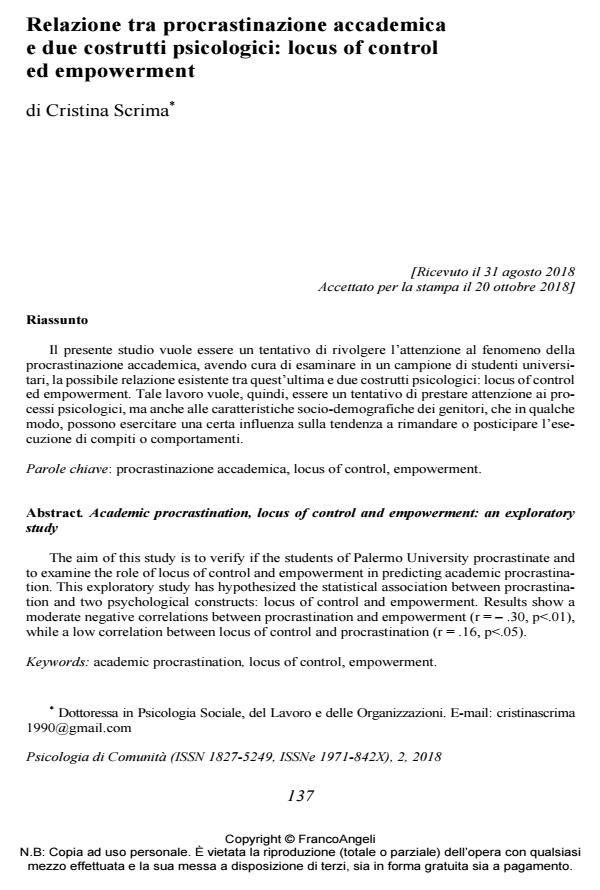Academic procrastination, locus of control and empowerment: an exploratory study
Journal title PSICOLOGIA DI COMUNITA’
Author/s Cristina Scrima
Publishing Year 2018 Issue 2018/2 Language Italian
Pages 16 P. 137-152 File size 217 KB
DOI 10.3280/PSC2018-002013
DOI is like a bar code for intellectual property: to have more infomation
click here
Below, you can see the article first page
If you want to buy this article in PDF format, you can do it, following the instructions to buy download credits

FrancoAngeli is member of Publishers International Linking Association, Inc (PILA), a not-for-profit association which run the CrossRef service enabling links to and from online scholarly content.
The aim of this study is to verify if the students of Palermo University procrastinate and to examine the role of locus of control and empowerment in predicting academic procrastination. This exploratory study has hypothesized the statistical association between procrastination and two psychological constructs: locus of control and empowerment. Results show a moderate negative correlations between procrastination and empowerment (r = ‒ .30, p<.01), while a low correlation between locus of control and procrastination (r = .16, p<.05).
Keywords: Academic procrastination, locus of control, empowerment
- Attribuzione casuale e successo scolastico (n.d.). -- Tratto da http:www.battistag.it
- Beck B.L., Koons S.R. e Milgrim D.L. (2000). Correlates and consequences of behavioural procrastination: The effect of academic procrastination, self-consciousness, self-esteem and self-handicapping. Journal of Social Behaviour & Personality, 15 (5): 3-13.
- Bruscaglioni M. (1994). Orizzonte empowerment: panoramica su significati applicazione dell’empowerment. Risorse Uomo, 2(3): 35-40.
- De Canale B. (n.d.). Empowerment. -- Tratto da http://nuovadidattica.com
- Deniz M.E., Traş, Z. e Aydoğan A. (2009). An investigation of Academic Procrastination, Locus of Control and Emotional Intelligence. Theory & Practice, 9 (2): 623-632.
- Klassen R., Krawchuk L. e Rajani S. (2008). Academic procrastination of undergraduates: Low self-efficacy to self-regulate predicts higher levels of procrastination. Contemporary Educational Psychology, 33: 915-931.
- Lavanco G., Novara C. (2012). Elementi di psicologia di comunità. Milano: McGraw-Hill.
- Nigro G. (1983). Contributo alla taratura italiana della scala di controllo Interno Esterno (I-E) di Rotter. Bollettino di Psicologia Applicata, 168: 29-41. -- http://hdl.handle.net/11591/215941
- Piccardo C. (1975). Empowerment e strategie di sviluppo organizzativo centrate sulla persona. Milano: Cortina.
- Rothblum E., Solomon L. e Murakami J. (1986). Affective, cognitive, and behavioural differences between high and low procrastinators. Journal of Counselling Psychology, 33: 387-394. DOI: 10.1037/0022-0167.33.4.387
- Rotter J.B. (1966). Generalized expectancies for internal versus external control of reinforcement. Journal of Consulting and Clinical Psychology, 43: 56-57.
- Schraw G., Wadkins T. e Olafson L. (2007). Doing the things we do: A grounded theory of academic procrastination. Journal of Educational Psychology, 99(1): 1225. DOI: 10.1037/0022-0663.99.1.1
- Schouwenburg H.C., Lay C.H. (1995). Trait procrastination and the Big ‒ five factors of personality. Personality and Individual Differences, 18(4): 481-490. DOI: 10.1016/0191-8869(94)00176-
- Zimmerman M.A., Rappaport J. (1988). Citizen Participation, Perceived Control and Psychological Empowerment. Journal of Community Psychology, 16: 725-50. DOI: 10.1007/BF0093002
Cristina Scrima, Relazione tra procrastinazione accademica e due costrutti psicologici: locus of control ed empowerment in "PSICOLOGIA DI COMUNITA’" 2/2018, pp 137-152, DOI: 10.3280/PSC2018-002013